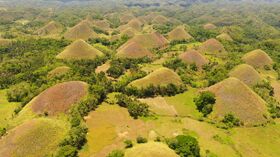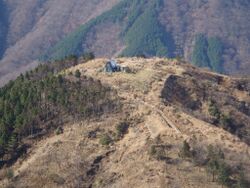X2ED6
X2ED6 ⻖ is Unicode character number 11990, KanjiRadical, JapanBeta, element of Japanese language.
X2ED6 ⻖ can be pronounced こざとへん (Kozatohen) and may denote a hill, mound [2].
X2ED6 ⻖ is easy to confuse with character X2ECF ⻏ that can be pronounced Oozato (おおざと) and may denote a village or a small town.
X2ED6 ⻖ is easy to confuse with character X961D 阝 that allow various pronunciations (Kozato こざと, Kozatohen こざとへん, Oozato おおざと) and may denote a hill, mound, village, town, community.
JapanBeta
X2ED6 ⻖ is interpreted as JapanBeta;
X2ED6 ⻖ it is element of the set denoted with symbol JapanBeta.
By definition, JapanBeta is set of following three Unicode characters:
X2ECF ⻏ [3], KanjiRadical
X2ED6 ⻖ [4], KanjiRadical
X961D 阝 [5], KanjiLiberal
At Macintosh default font, all the three characters
⻏, ⻖, 阝 look just the same:
![]()
At Linux, characters
⻏ and ⻖ look the same, but 阝 appears a little bit smaller: ![]()
Even a native Japanese speaker, watching characters ⻏⻖ 阝
is unlikely to answer:
Which of them is X2ECF?
Which of them is X2ED6?
Which of them is X961D?
For such a case, the correct specification of the character is "⻏ X2ECF or ⻖ X2ED6 or 阝 X961D"
Term JapanBeta (or JapanB) is defined to substitute this long and complicated construction with single word.
Up to year 2021, the computer support of the Japanese characters is underdeveloped. No united default font is established, that would allow each character to look in the same at various computers, but different from other characters.
While this fault is not corrected, the general term JapanBeta has sense.
In each of the specific cases, the confusive character can be specified with its hexadecimal number ( X2ECF or X2ED6 or X961D), or with its ascii name (Kozato, Kozatohen or Oozato), or with its phonetic representation through Hiragana (こざと, こざとへん or おおざと).
Up to year 2021, no commonly accepted bijection between these sets of names seem to be established.
Component of other kanjis
X2ED6 ⻖ is considered as component of images of other kanjis.
Image similar to ⻖ may appear at the left hand side of a kanji, if the meaning is somehow related with a hill, mound.
Similar image may appear at the right hand side of a kanji, if its meaning is somehow related with a town, a village; in this case, the JapanBeta is interpreted as X2ECF ⻏.
References
- ↑ https://www.istockphoto.com/jp/search/2/image?phrase=chocolate+hills Chocolate Hillsのストックフォト (2021)
- ↑ https://kanjialive.com/214-traditional-kanji-radicals/ The 214 traditional kanji radicals and their variants .. ⻏ つくり Radical on the right village, country, city おおざと a variant of ⾢(むら) Important .. ⻖ へん Radical on the left hill, mound こざとへん a variant of ⾩(こざと) Important
- ↑ https://util.unicode.org/UnicodeJsps/character.jsp?a=2ECF ⻏ 2ECF CJK RADICAL CITY Han Script id: allowed confuse: ⻖ , 阝 ..
- ↑ https://util.unicode.org/UnicodeJsps/character.jsp?a=2ED6 ⻖ 2ED6 CJK RADICAL MOUND TWO Han Script id: allowed confuse: 阝 , ⻏ ..
- ↑ https://util.unicode.org/UnicodeJsps/character.jsp?a=961D 阝 961D CJK UNIFIED IDEOGRAPH-961D Han Script id: restricted confuse: ⻖ , ⻏

